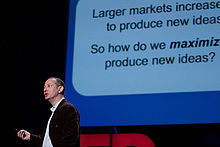Economics on Buying vs Renting a House
Joyce Park stashed this in Economics
Stashed in: Winner take all., Awesome, Homeless, Economics, Housing, Personal Finance
Answer by libertarian-leaning economist Alex Tabarrok. Strangely does not deal AT ALL with the #1 issue of housing these days, which is the extreme power-law nature of the beast. He looks at the average-to-below-average cases -- people whose houses lose value along with job loss in the area, and they don't move because they're tied to the house -- but he doesn't mention areas like San Francisco or New York where strong employment goes hand in hand with strong home price growth. It's winner take all, not creamy peanut butter.
I agree that for anywhere BUT the SF Bay Area, New York, and a few other location where demand outstrips supply geographically, he's right that housing is not a good investment vehicle.
My bigger point is that there is that inequality -- or winner-take-all -- seems to be increasingly tied up with real estate. The places that have a lot of high-paying jobs tend to also have strong housing markets and vice versa. Also the places that are "affordable", in other words the kinds of places where people tend to move specifically so they can buy a house and raise a family, are also the places where they are likely to experience a job loss that can't easily be made up.
Here is a good interactive chart in most US cities since 1980:
http://www.economist.com/blogs/graphicdetail/2015/11/daily-chart-0
I see your point, and it's a good point.
The strong housing markets in the places with high paying jobs price out people who want to move there seeking high paying jobs. The inequality is a vicious cycle.











4:00 PM Feb 01 2016